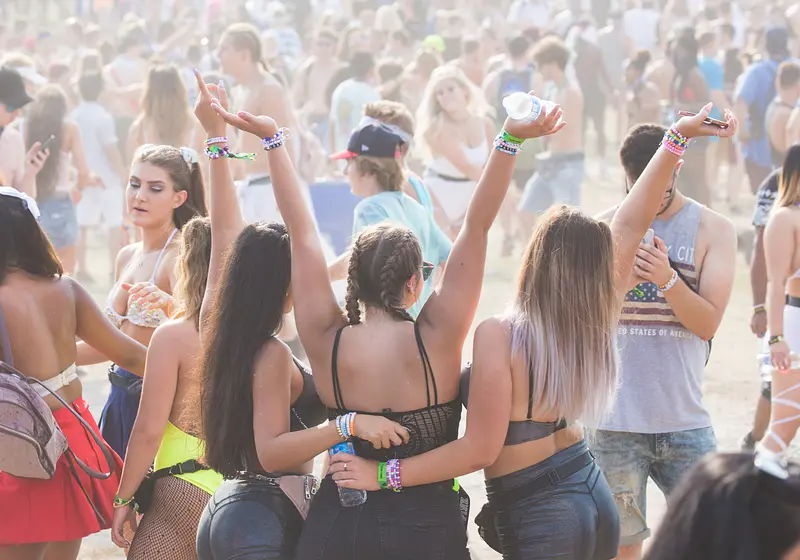Can you name a single thing that teenage girls can like without being made fun of? I thought so.
Take TikTok, boybands, TV shows, books, movies, and almost every other form of popular culture. If it’s liked by teenage girls, it automatically becomes of less value.
Why is that so, and why the double standard when it comes to the opposite sex’s interests? Let’s find out.
Let us slide into your dms 🥰
Get notified of top trending articles like this one every week! (we won't spam you)Why it happens
For some people, “fangirling” immediately brings to mind hysterical teen girls screaming about One Direction. But the thing is, that’s their way of expressing their joy, which is mislabeled.
Sure, there are some people that become hysterical and obsessive, even creepy. But out of a fandom of 30-40 million people, a couple bad eggs that you’ll probably never meet? It's not worth belittling their interests for the sake of your “superior” ones.
Especially when such actions are mirrored by obsessive sports fans, but that seems to go unnoticed.
Take the Quiz: Which Indian city is the perfect holiday spot for you!?
Let's match you with an Indian city that you would love!
Why they're wrong
Paul Johnson said the following about Beatles fans: “Those who flock round the Beatles, who scream themselves into hysteria, whose vacant faces flicker over the TV screen, are the least fortunate of their generation, the dull, the idle, the failures.”
But that’s just not true.
Teenage girls form critical worldviews and observations based on their interests. Take YA fantasy. Teenage girls develop their critical thinking skills, writing, literary analysis skills, etc.
Take music for example. Dissecting music videos and music is something that fandoms do all the time. For e.g., the BTS ARMY regularly muses about music videos and their wider correlations. These theories often go into discussing Jungian philosophy and the concept of self-love.
4 Carl Jung Theories Explained: PERSONA, SHADOW, ANIMA/ANIMUS(The anima is the Jungian concept of the female image within the male, which acts as a mediating force between the EGO and the unconscious). The SELF So #BTS_BE is about Self-reflection pic.twitter.com/ooVAxKpzNF
— joonie 🐨 (@rmonimon) October 31, 2020
And you say that they are the least fortunate of their generation.
“When the reality is that teen girls are often very intentional about what they're interested in and aware of the social influences behind those media products, and they deliberately use excitement and passion as the foundation for community-building and empathetic development.”
— Bailey Poland
Some say the hate for teenage girls' culture is rooted in 19th-century ideas of female hysteria. Women, especially young women, can’t control their emotions, and get excited and worked up about useless matters. They’re weak-minded and slaves to trends that come and go.
That notion is baseless, with the concept of female hysteria being incredibly controversial. “Useless matters” are subjective, and nobody has the right to ridicule anyone else for their interests (as long as they don’t harm anyone else.) It’s that simple.
You see, there are many instances where if teenage girls like something, society automatically writes it off. Whether it’s Taylor Swift, Twilight, Billie Eilish, YA fantasy novels, boybands it’s all criticized and looked down upon for being targeted at teenage girls.
The unfair criticism of the content
The irony is, they produce good content.
Taylor Swift has been nominated at the Grammys 32 times and has won 10 of them. Billie Eilish, an 18-year-old, has won 5.
People look down on boybands for their seeming lack of musical integrity. But they ignore the music they produce, the songwriting, the love and the thought that goes into it.
Twilight, for all its misgivings, isn’t the first bad movie out there. There are tons of action movies marketed towards young boys that are as bad. But you don’t see them being called “cringey” Every.
Single. Day.
Even if you don’t like the content, teenage girls do. There is no reason to invalidate these interests just because the fan base is primarily made up of teenage girls.
The double standard
When’s the last time a boy was ridiculed for liking football or some other sport?
It’s almost as if interests of boys and men are seen as inherently more valuable and interesting and better. The fields of sports, technology, geekdom and video games are seen as male-dominated. Fanboying over them isn’t considered obsessive or hysterical.
It’s not considered as hysterical when sports fans weep when their favorite team loses or destroy property when they win. But it is considered hysterical when K-Pop fans scream with joy at their very first concert.
And here we find the underlying cultural misogyny.
The interests of teenage girls aren’t taken seriously and considered as “silly” just because teenage girls like them. Sure, some of them are a bit odd, there’s some awful stuff that people find entertaining, but they bring these girls joy. If it brings them joy and doesn’t harm anyone else, that’s all that matters.
Popular culture made for teenage girls isn’t bad, society just has a problem with teenage girls.
Even the way some people express their love and interests ridiculed, such as social media fan pages, projects, fanart, etc. The same cannot be said for fan pages of sports and video games.
Why it needs to stop
Teenage girls are belittled for things that bring them happiness, and it’s so frustrating. It’s become normalized in modern society, which could be extremely dangerous.
“Our thoughts must surely go out to anybody unlucky enough to have given birth to a female child between seven and 14 years ago,” writes Stuart Heritage for The Guardian.
This results in teenagers downplaying their interests or engaging in them and become subject to relentless bullying and teasing that makes them lose faith in them. If I had a penny for every time I was mocked for liking K-Pop or enjoying YA novels, I’d be the next Jeff Bezos.
If you take away the one source of joy that teenage girls have, in a world that piles self-esteem and body image issues onto them, nothing good is going to come out of it.
The issue is, the internalized misogyny isn’t just present in boys or older adults who ridicule teenage interests. It’s even rooted in how girls look down on other girls who, as an example, enjoyed Twilight. It’s so deep-rooted and normalized, and incredibly harmful because it perpetuates unnecessary stereotypes.
So perhaps next time you to mock someone for liking K-Pop, One Direction, Billie Eilish, TikTok, YA fantasy, Justin Bieber, Minecraft YouTubers (I could go on), stop and think.
Would you say that to a similar-minded sports fan? If not, keep it to yourself and have a think about your internalized cultural misogyny. The world may be a bit kinder to teenage girls for it.










